Understanding equanimity in Buddhism – The Fourth Kind of Love that liberates you from the shackles of misery.
Suffering. It is an inherent part of life and none of us can deny the reality of its existence. In Buddhism, suffering has a cause and an end.
Most core principles in Buddhism are based on the existence of suffering and how we can free ourselves from it.
There are many ways mentioned by Gautama Buddha that can allow us to accept and end suffering. And one of the tenets of Buddhist philosophy is equanimity, the fourth kind of love.
Equanimity in Buddhism allows you to connect with and accept suffering without getting attached to or consumed by it. It is based on the experience of acceptance and letting go.
“Equanimity is the hallmark of spirituality. It is neither chasing nor avoiding but just being in the middle.” – Amit Ray
Our world is changing constantly. We never know when and how our lives may flip upside down. We don’t know when we might lose a loved one, develop a terminal illness, lose our jobs, experience an accident, or some random mishap.
Likewise, we cannot predict whether we will overcome an unpredictable setback and how we will get our life back on track. But we always seem to find a way. Most of us overcome even the worst times and manage to rebuild our lives once again.
Read The Four Aspects of True Love by Thich Nhat Hahn
So it is crucial that we keep our mind, heart, and spirit strong and not react instinctively. That we don’t get attached to the suffering.
That we don’t cling to the pain. Instead, according to Buddhist philosophy, what we need to do is practice love, kindness, compassion, joy, and equanimity or even-mindedness to face the various waves of change without getting drowned.

What is equanimity?
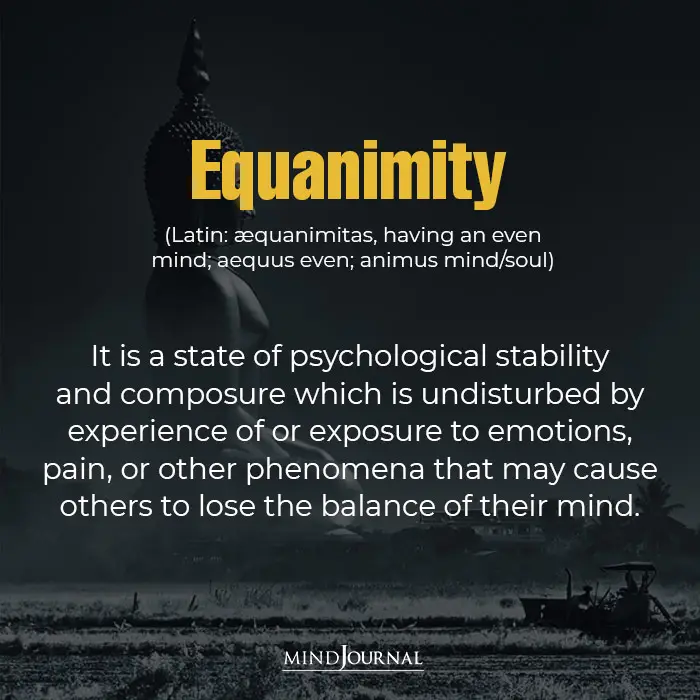
“Equanimity is a perfect, unshakable balance of mind.” – Nyanaponika Thera
According to Buddhism, there are 4 kinds of love. These four sublime states and the accompanying meditation practices to cultivate them are known as Brahma-vihara in the Pali language.
These four forms of love, known as ‘Appamaññā’ in Pali, are identified as the four immeasurables or four infinite minds.
According to Buddha, these 4 sublime states of mind are:
- Loving-kindness or Love (metta)
- Compassion (karuna)
- Sympathetic Joy (mudita)
- Equanimity (upekkha)
Although the fourth kind of love may not invoke feelings of affection in your heart, it is perhaps the most profound and deep-set virtue of the four which binds the other three immeasurable.
Equanimity in Buddhism, or disinterestedness or even-mindedness, provides us the necessary stability of mind which enables us to be aware of the present and accept the conditions with an open mind and heart, regardless of how difficult or pleasing it is.
The boundless virtues of loving-kindness, compassion, and sympathetic joy are firmly based on the boundlessness of equanimity. The interdependent traits of the four immeasurables form a solid foundation for effectively liberating yourself from suffering.
The practice of equanimity in Buddhism enables you to experience inner peace, calm, and trust which gives you the strength to accept, and simultaneously let go of the world.
It is the consciousness of observing without getting attached to the outcome. You are able to see without clinging to what you see.

Equanimity in Buddhism
Equanimity in Buddhism, one of the 4 sublime virtues, can be translated into two different words in Pali, a language used by Gautama Buddha –
- Upekkhā or Upekṣā
- Tatramajjhattata
Upekkha, in the most common sense, means “to look over” and is a mental state that should be cultivated to achieve ‘nirvāna’. It should arise from our ability to observe and our capacity to stay detached from what we see.
Bhikkhu Bodhi, American Theravada Buddhist monk, author, and president of the Buddhist Publication Society, said:
“The real meaning of upekkha is equanimity, not indifference in the sense of unconcern for others. As a spiritual virtue, upekkha means stability in the face of the fluctuations of worldly fortune.
It is evenness of mind, unshakeable freedom of mind, a state of inner equipoise that cannot be upset by gain and loss, honor and dishonor, praise and blame, pleasure, and pain.
Upekkha is freedom from all points of self-reference; it is indifference only to the demands of the ego-self with its craving for pleasure and position, not to the well-being of one’s fellow human beings.
True equanimity is the pinnacle of the four social attitudes that the Buddhist texts call the ‘divine abodes’: boundless loving-kindness, compassion, altruistic joy, and equanimity.
The last does not override and negate the preceding three, but perfects and consummates them.”
The word ‘Tatramajjhattata’ can be broken into different Pali words that can help us gain a better understanding of the practice of equanimity in Buddhism. ‘Tatra’ can refer to ‘all things’ or ‘there’.
‘Majjha’ means ‘middle’; while ‘Ttata’ refers to pose or ‘to stand’. In this sense, this concept means “being in the middle”. It refers to maintaining balance even in chaos and conflict. It means finding your center in the midst of whatever is going around you.
Read How To Boost Your Spiritual Growth and Development
This type of mental balance can be attained through mental stability & strength, integrity, confidence, inner peace, vitality, and mental, spiritual, and emotional well-being.
It enables us to stay upright and navigate through life without getting excessively affected or attached. Equanimity in Buddhism can be developed through meditation and mindfulness about the simple things of life.
As your mindfulness gets stronger, so does your equanimity. It is not an emotion or thought, but a conscious awareness of the impermanent nature of life and reality.
It is the foundation for freedom, wisdom, compassion, and unconditional love. Equanimity in Buddhism is not about being aloof but about warmth and joy.

Equanimity in Buddhism refers to the state when your mind is “abundant, exalted, immeasurable, without hostility and without ill-will”, as described by Siddhartha Gautama.
Read Why Non-Attachment Is The Key To Finding Inner Peace
Equanimity in other beliefs
“Equanimity arises when we accept the way things are.” – Jack Kornfield
The concept of equanimity is widely prevalent in different spiritual & philosophical beliefs and is not restricted only to Buddhism.
In Hinduism
Equanimity is known as ‘Samatvam’ in Sanskrit. According to Hinduism, ‘Sāmya’, a variant of ‘Samatvam’, means “equal consideration towards all human beings.”
According to the ancient Sanskrit scripture Bhagavad Gita, this concept refers to a state of even-mindedness. The term ‘Upekṣhā’ is also used in Sanskrit for equanimity.
The Bhagavad Gita (Chapter Two, Verse 48), states :
“Perform your duty equipoised, O Arjuna, abandoning all attachment to success or failure. Such equanimity is called yoga.”
However, this spiritual idea is not only limited to Eastern beliefs. It forms a crucial part of various Western beliefs and philosophies as well.
In Judaism
Equanimity or Hishtavut is a crucial aspect of Jewish beliefs for spiritual and moral development. According to Wikipedia, equanimity is a virtue that is specifically mentioned in the works of Rabbi Simcha Zissel Ziv and Rabbi Yisroel Bal Shem Tov.
Moreover, Rabbi Chaim Vital believes that equanimity is a prerequisite to meditation and is necessary for experiencing divine inspiration and realizing divine prophecy.
In Christianity
According to Christian philosophy, the virtue of equanimity is believed to be crucial for practicing the theological virtues of charity, temperance, gentleness, modesty, and contentment.
Temperance, patience, and forbearance enable us to choose and appreciate sacrifice, reduce the impact of affliction, and realize that all our pain and suffering will lead to God’s blessings.
St. Paul states in Philippians 4:11:13:
“I have learned to be content with whatever I have. I know what it is to have little, and I know what it is to have plenty.
In any and all circumstances I have learned the secret of being well-fed and of going hungry, of having plenty, and of being in need. I can do all things through him who strengthens me.”
In Stoicism
The Stoics believe calmness is strength. The core beliefs of Stoic principles and ethics are based on the concept of equanimity.
The term ‘Ataraxia’ or ‘Apatheia’ was used by Greek Stoics and the Latin term ‘Aequanimitas’ was used by Roman Stoics for equanimity.
Meditations, the personal writings of Roman Emperor Marcus Aurelius on Stoic philosophy, describe how we can cultivate equanimity in chaos and conflict through the help of nature.
“You always own the option of having no opinion. There is never any need to get worked up or to trouble your soul about things you can’t control. These things are not asking to be judged by you. Leave them alone.” – Marcus Aurelius, Meditations
Knowing equanimity definition is not enough, so let’s understand the Essence of Equanimity…
Equanimity in Buddhism is an ideal state of mental balance that is firmly rooted in insight. However, it is imperative that equanimity is based on awareness, instead of dull indifferentness.
It should be an intentional effort rather than a casual, fleeting mood. When equanimity is based on insight, it will be a stronger and more impactful practice.
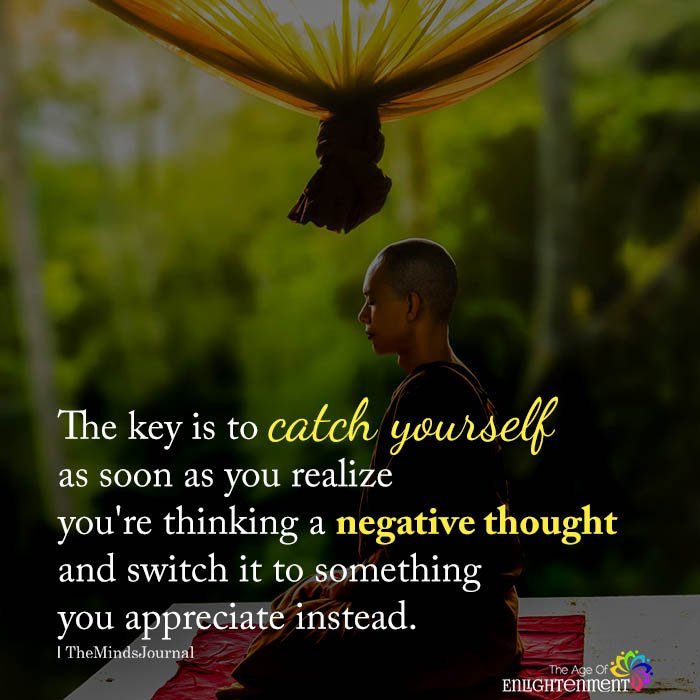
The concept of ‘Anatta’ or no-self is one of the core insights on which equanimity is based. Anatta is one of the most important notions of Buddhism.
Also known as ‘Anatma’ in Sanskrit, Anatta refers to everything that is present outside the Self, according to The Buddha’s teachings. It is the absence of the Self or all that is other than the Self.
The concept states that no deed is conducted by any particular self nor can the outcomes affect any specific self.
Moreover, there is no such thing that we can claim as “our own”. It is merely an illusion of self that leads to suffering and affects our equanimity adversely.
“Peaceful in the body, peaceful in speech, The bhikkhu who is peaceful and well-concentrated And who has rejected the world’s bait is called ‘one at peace.’” – The Buddha (Dhammapada)
As we do not “own” anything, we shouldn’t be disturbed when anything is lost. Our sense of equanimity shouldn’t be based on the idea of Self, rather it should be rooted in the notion of ‘no-self’.
To cultivate equanimity, you need to let go of all thoughts of the self that make you believe that you possess or own something.
You can start by detaching yourself from simple things and eventually work your way up to release any thoughts, emotions, or things that you may desperately cling to.
It is only by practicing detachment one can cultivate equanimity. The teachings of ‘Anatta’ are our guide on the path of attaining perfect, unshakable equanimity.
However, this should not be misunderstood to mean that it is the renunciation or contradiction of compassion, affection, joy, or love. In fact, equanimity is the culmination and the epitome of the four sublime virtues.
Read Choose A Mandala And Discover Your Hidden Magical Power
Is ‘Upekkha’ a form of love? Or indifference?
“Without equanimity, we might give love to others only in an effort to bridge the inevitable and healthy space that always exists between two people.” – Sharon Salzberg
When we use words like ‘Upekkha’, indifference, and even-mindedness to describe equanimity in Buddhism, it can be hard to relate it with love, kindness, compassion, and joy. But equanimity is the essence of love.
Perhaps, we should describe equanimity as even-minded love or equanimous love. Arahant Upatissa, the 1st century Theravada Buddhist monk and author of the Buddhist meditation manual Vimuttimagga (The Path to Freedom), describes equanimity as:
“As parents are neither too attentive nor yet inattentive towards any one of their children, but regard them equally and maintain an even mind towards them, so through equanimity one maintains an even mind towards all beings. Thus should equanimity be known.”
The way the Sri Lankan monk compares upekkha with parenting shows how much love, intimacy, and warmth lie in equanimity.
When you truly and profoundly realize that all beings are equal and connected, that all of them want freedom from suffering and experience joy and happiness, and that suffering for each one of us is equally afflicting, you will never again seek happiness at the cost of another person.
You will have compassion and sympathy for everyone.
Even-minded love enables us to divert our attention from the issues of individual relationships and instead fill our minds with the practices of loving-kindness, compassion, and joyful appreciation, so that whosoever we encounter or experience, whether mentally or physically, experiences love, appreciation, compassion and kindness.
Read 8 Buddhist Beliefs To Heal Your Soul and Find Happiness
Even-minded love allows us to let go of all attachments and thoughts of possessions so that we can love unconditionally without being affected by the fear of loss or any other undesirable outcome. In this sense, equanimity empowers us to experience love that is pure and true.

Equanimity In Buddhism Is love
It is a kind of love that’s based on even-mindedness that allows us to show kindness and compassion to all by letting go of our expectations and biases.
It allows us to love all beings and wish everyone happiness & well-being. It allows us to experience and feel different types of love in the most honest and genuine way, love that is not limited by negativity.
Equanimity is the fourth and most important kind of love that liberates us and others to enjoy a love that is pure, ‘selfless, and even-minded.
“For one who clings, motion exists; but for one who clings not, there is no motion. Where no motion is, there is stillness. Where stillness is, there is no craving. Where no craving is, there is neither coming nor going.
Where no coming nor going is, there is neither arising nor passing away. Where neither arising nor passing away is, there is neither this world nor a world beyond, nor a state between. This, verily, is the end of suffering. – The Buddha (Udana 8:3)
Please share your thoughts on equanimity in Buddhism by commenting below.
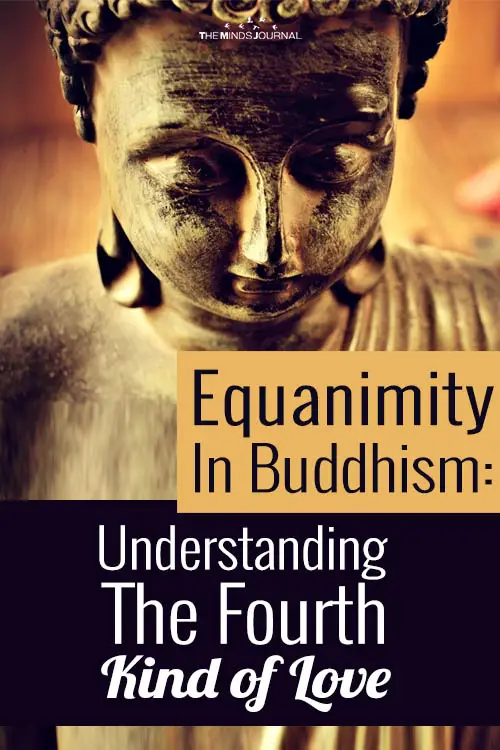
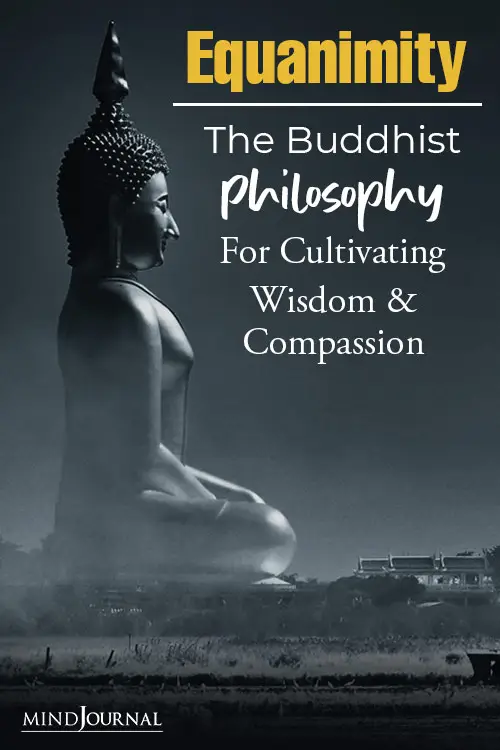
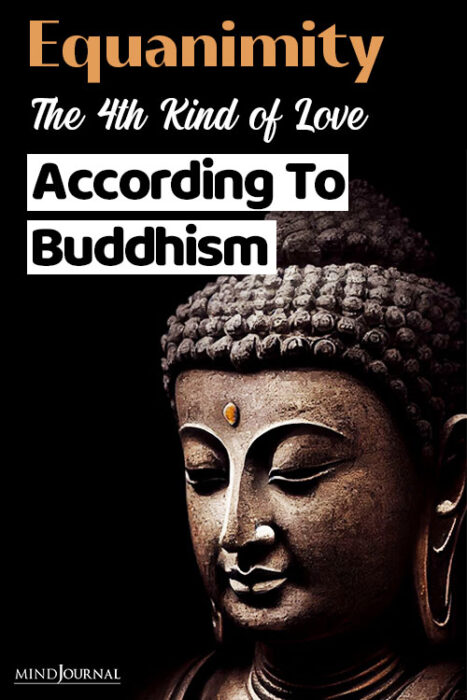
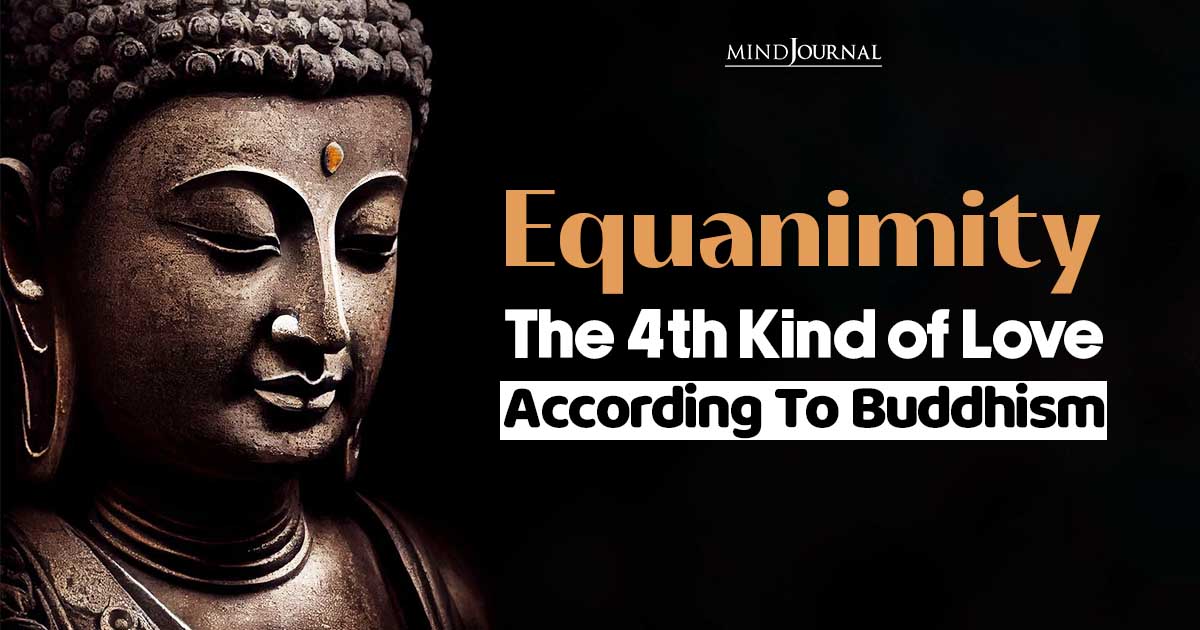
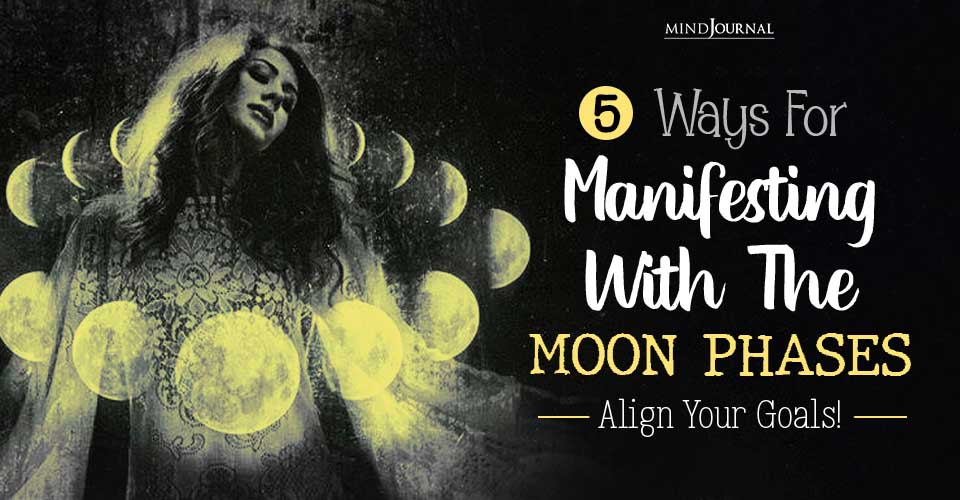

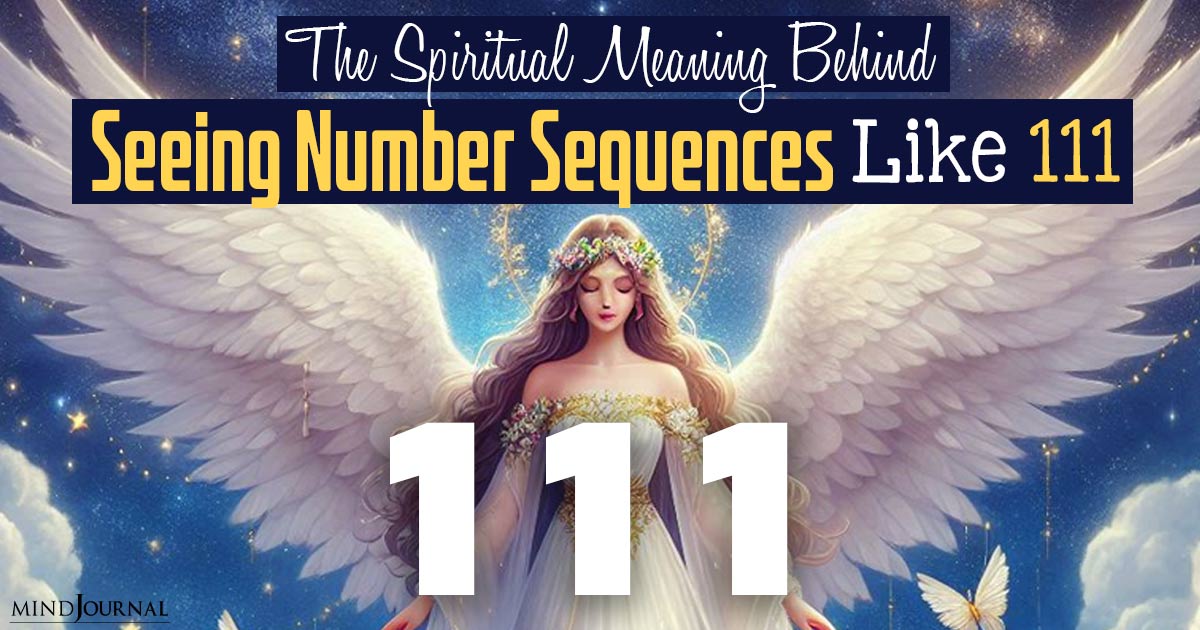

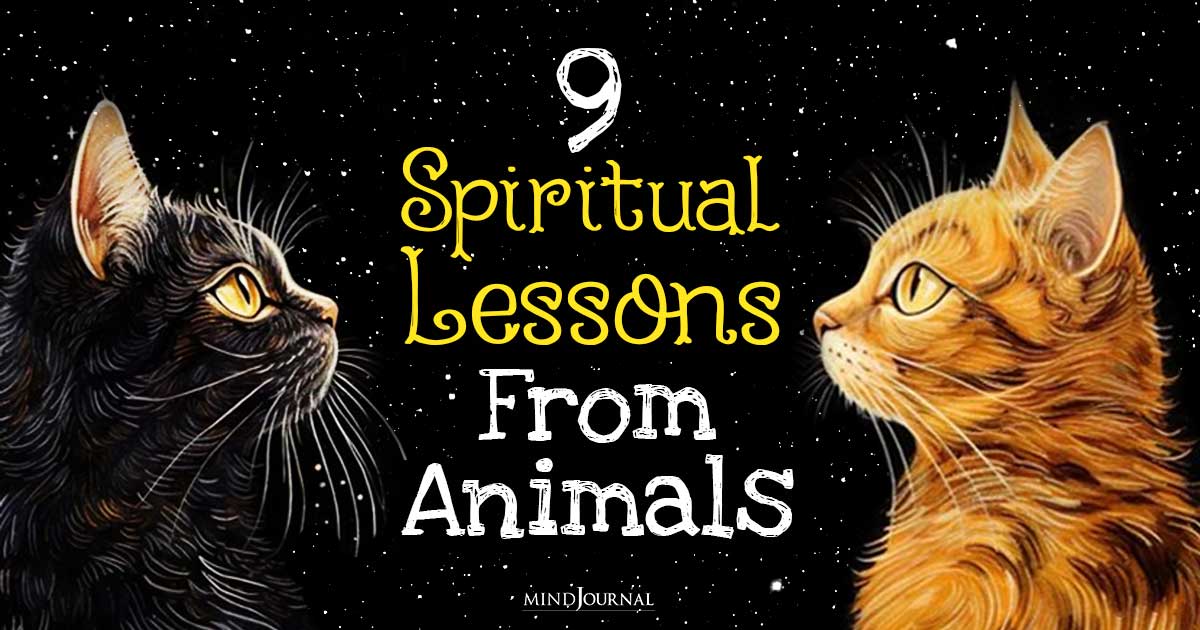


Leave a Reply
You must be logged in to post a comment.